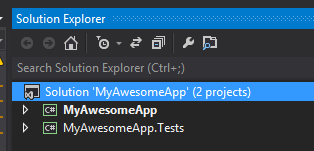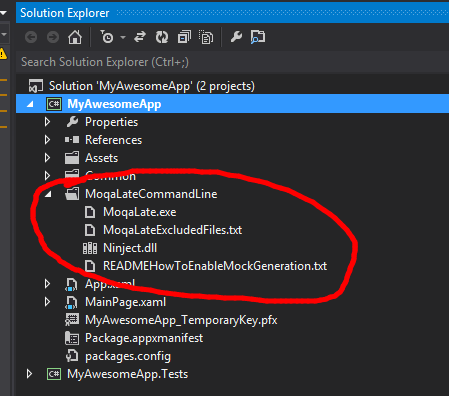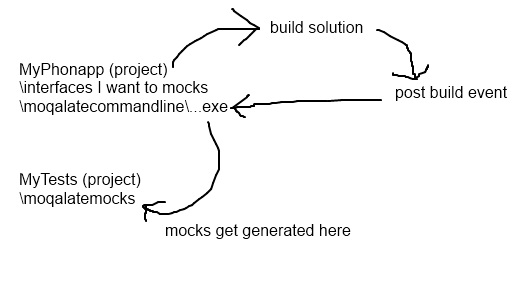xUnit.net allows the creation of data-driven tests. These kind of tests get their test data from outside the test method code via parameters added to the test method signature.
Say we had to test a Calculator class and check it’s add method returned the correct results for six different test cases. Without data-driven tests we’d either have to write six separates tests (with almost identical code) or some loop inside our test method containing an assert.
Regular xUnit.net test methods are identified by applying the [Fact] attribute. Data-driven tests instead use the [Theory] attribute.
To get data-driven features and the [Theory] attribute, install the xUnit.net Extensions NuGet package in addition to the standard xUnit.net package.
Creating Inline Data-Driven Tests
The [InlineData] attribute allows us to specify test data that gets passed to the parameters of test method.
So for our Calculator add test we’d start by defining the test method:
More...
SHARE:
To help people get started with xUnit.net and as an accompaniment to my Pluralsight xUnit.net training course I thought I’d create a cheat sheet showing common assert methods and attributes. Hopefully will be of use :)
More...
SHARE:
My latest Pluralsight course on the xUnit.net testing framework has just been released.
Course Description
Learn the latest in unit testing technology for C#, VB.NET (and other .NET languages) created by the original inventor of NUnit.
xUnit.net is a free, extensible, open source framework designed for programmers that aligns more closely with the .NET platform.
You can check it out now on Pluralsight.com.
You can start watching with a Pluralsight free trial.


SHARE:
My newest Pluralsight course has just been published.
We shouldn't live in fear of our code
Long-term customer satisfaction, agility, and developer happiness are crucial. A quality suite of automated tests helps achieve this. This practical course covers how and what to test at the unit, integration, and functional UI levels; and how to bring them all together with TeamCity continuous integration build server.
The course helps to keep your software soft with the right automated tests at the right level.
You can start watching with a Pluralsight free trial.


SHARE:
Just knocked up this quick and dirty video explaining how to set up MoqaLate in a Windows Store app solution.
You can find out more about MoqaLate on the MoqaLate project home page.
SHARE:
With Windows Store apps there are challenges getting traditional mocking frameworks such as Rhino and Moq working due to limited reflection support in the platform (presumably for security reasons).
I wrote a mocking solution when Windows Phone 7 first came out, it can also be used for Windows Store apps. I’ve updated the NuGet descriptions etc. to reflect this.
How To Do TDD with Mocking in Windows Store Apps
Create a new (C#/XAML) Windows Store app project in Visual Studio called “MyAwesomeApp”.
Create your test project “MyAwesomeApp.Tests” and reference your main app.

In the main app project, install the MoqaLate NuGet package. When the package is installed you will have a new folder in the main app solution called “MoqaLateCommandLine”:

(Inside this folder is a readmexxx.txt file with some additional info)
More...
SHARE:
The below is an excerpt from the latest chapter “An Introduction to Unit Testing With xUnit.net” from my book Keeping Software Soft.
xUnit.net provides a number of ways for checking (asserting) results are as expected.
The following explanatory tests shown the different types of assertions that xUnit.net supports:
using System;
using System.Collections.Generic;
using Xunit;
namespace KeepingSoftwareSoftSamples.XUnitTestingDemo
{
public class XUnitAssertExamples
{
[Fact]
public void SimpleAssertsThatOneValueEqualsAnother()
{
Assert.Equal(1, 2); // fail
Assert.Equal("hello", "hello"); // pass
Assert.NotEqual(1, 2); // pass
Assert.NotEqual("hello", "hello"); // fail
}
[Fact]
public void BooleanAsserts()
{
Assert.True(true); // pass
Assert.True(false); // fail
Assert.False(false); // pass
Assert.False(true); // fail
// Don't do this
Assert.True(1 == 1); // pass
}
[Fact]
public void Ranges()
{
const int value = 22;
Assert.InRange(value, 21, 100); // pass
Assert.InRange(value, 22, 100); // pass
Assert.NotInRange(value, 999, 99999); // pass
Assert.InRange(value, 23, 100); // fail
}
[Fact]
public void Nulls()
{
Assert.Null(null); // pass
Assert.NotNull("hello"); // pass
Assert.NotNull(null); // fail
}
[Fact]
public void ReferenceEquality()
{
var objectA = new Object();
var objectB = new Object();
Assert.Same(objectA, objectB); // fail
Assert.NotSame(objectA, objectB); // pass
}
[Fact]
public void AnIEnumberableContainsASpecificItem()
{
var days = new List<string>
{
"Monday",
"Tuesday"
};
Assert.Contains("Monday", days); // pass
Assert.Contains("Friday", days); // fail
Assert.DoesNotContain("Friday", days); // pass
}
[Fact]
public void IEnumerableEmptiness()
{
var aCollection = new List<string>();
Assert.Empty(aCollection); // pass
aCollection.Add("now no longer empty");
Assert.NotEmpty(aCollection); // pass
Assert.Empty(aCollection); // fail
}
[Fact]
public void IsASpecificType()
{
Assert.IsType<string>("hello"); // pass
Assert.IsNotType<int>("hello"); // pass
Assert.IsType<int>("hello"); // fail
}
[Fact]
public void IsAssignableFrom()
{
const string stringVariable = "42";
Assert.IsAssignableFrom<string>(stringVariable); // pass
Assert.IsAssignableFrom<int>(stringVariable); // fail
}
}
}
To learn more about xUnit.net check out my xUnit.net Pluralsight course.
You can start watching with a Pluralsight free trial.


SHARE:
Until xUnit officially supports* Windows store apps you can get xUnit working with your WinRT app by doing the following:
In Visual Studio 2012, go to Tools menu, Extensions and Updates; search for and install “xUnit.net runner for Visual Studio 2012”.

In Visual Studio 2012, go to Tools menu, Extensions and Updates; search for and install “xUnit Test Library Template”.

You may have to restart Visual Studio…
More...
SHARE:
Introducing MoqaLate
Whilst I love developing apps for Windows Phone 7, the testing aspect is hard! I'm a TDD-er by default and it's such a pain to have to hand roll my own mock objects.
So I created MoqaLate.
It's an alpha version but is usable now.
Not sure framework is the right term but it's something that generates mocks from your interfaces.
Add to existing project from NuGet:
PM> Install-Package MoqaLate
Read more about the project.
Download an example solution.
Read (currently very basic!) documentation.
View on NuGet.org
Awesome overview diagram :)

SHARE: